The Stablecoin Trap: The Backdoor to Total Financial Control

By Aaron Day / The Brownstone Institute
Republished under a Creative Commons Attribution 4.0 International License
[To listen to this post, click the gray arrow above, then click the blue musical note on the page that opens.]
The walls are closing in on your financial freedom—but not in the way most Americans believe.
While the debate rages over the future threat of Central Bank Digital Currencies (CBDCs), a far more insidious reality has already taken hold: our existing financial system already functions as a digital control grid, monitoring transactions, restricting choices, and enforcing compliance through programmable money.
For over two years, my wife and I have traveled across 22 states warning about the rapid expansion of financial surveillance. What began as research into cryptocurrency crackdowns revealed something far more alarming: the United States already operates under what amounts to a CBDC.
- 92% of all US dollars exist only as entries in databases.
- Your transactions are monitored by government agencies—without warrants.
- Your access to money can be revoked at any time with a keystroke.
The Federal Reserve processes over $4 trillion daily through its Oracle database system, while commercial banks impose programmable restrictions on what you can buy and how you can spend your own money. The IRS, NSA, and Treasury Department collect and analyze financial data without meaningful oversight, weaponizing money as a tool of control. This isn’t speculation—it’s documented reality.
Now, as President Trump’s Executive Order 14178 ostensibly “bans” CBDCs, his administration is quietly advancing stablecoin legislation that would hand digital currency control to the same banking cartel that owns the Federal Reserve. The STABLE Act and GENIUS Act don’t protect financial privacy—they enshrine financial surveillance into law, requiring strict KYC tracking on every transaction.
This isn’t defeating digital tyranny—it’s rebranding it.
This article cuts through the distractions to expose a sobering truth: the battle isn’t about stopping a future CBDC—it’s about recognizing the financial surveillance system that already exists. Your financial sovereignty is already under attack, and the last off-ramps are disappearing.
The time for complacency has passed. The surveillance state isn’t coming—it’s here.
Understanding the Battlefield: Key Terms and Concepts
To fully grasp how deeply financial surveillance has already penetrated our lives, we must first understand the terminology being used—and often deliberately obscured—by government officials, central bankers, and financial institutions. The following key definitions will serve as a foundation for our discussion, cutting through the technical jargon to reveal the true nature of what’s at stake:
Before diving deeper into the financial surveillance system we face today, let’s establish clear definitions for the key concepts discussed throughout this article:
Central Bank Digital Currency (CBDC)
A digital form of central bank money, issued and controlled by a nation’s monetary authority. While often portrayed as a future innovation, I argue in “Fifty Shades of Central Bank Tyranny” that the US dollar already functions as a CBDC, with over 92% existing only as digital entries in Federal Reserve and commercial bank databases.
Stablecoin
A type of cryptocurrency designed to maintain a stable value by pegging to an external asset, typically the US dollar. Major examples include:
- Tether (USDT): The largest stablecoin ($140 billion market cap), managed by Tether Limited with reserves held by Cantor Fitzgerald
- USD Coin (USDC): Second-largest stablecoin ($25 billion market cap), issued by Circle Internet Financial with backing from Goldman Sachs and BlackRock
- Bank-Issued Stablecoins: Stablecoins issued directly by major financial institutions like JPMorgan Chase (JPM Coin) or Bank of America, which function as digital dollars but remain under full regulatory control, allowing programmable restrictions and surveillance comparable to a CBDC.
Tokenization
The process of converting rights to an asset into a digital token on a blockchain or database. This applies to both currencies and other assets like real estate, stocks, or commodities. Tokenization enables:
- Digital representation of ownership
- Programmability (restrictions on how/when/where assets can be used)
- Traceability of all transactions
Regulated Liability Network (RLN)
A proposed financial infrastructure that would connect central banks, commercial banks, and tokenized assets on a unified digital platform, enabling comprehensive tracking and potential control of all financial assets.
Privacy Coins
Cryptocurrencies specifically designed to preserve transaction privacy and resist surveillance:
- Monero (XMR): Uses ring signatures, stealth addresses, and confidential transactions to conceal sender, receiver, and amount
- Zano (ZANO): Offers enhanced privacy with Confidential Layer technology that can extend privacy features to other cryptocurrencies
Programmable Money
Currency that contains embedded rules controlling how, when, where, and by whom it can be used. Examples already exist in:
- Health Savings Accounts (HSAs) that restrict purchases to approved medical expenses
- The Doconomy Mastercard that tracks and limits spending based on carbon footprint
- Electronic Benefit Transfer (EBT) cards that restrict purchases to approved food items
Know Your Customer (KYC) / Anti-Money Laundering (AML)
Regulatory frameworks require financial institutions to verify customer identities and report suspicious transactions. While ostensibly aimed at preventing crime, these regulations have expanded to create comprehensive financial surveillance with minimal oversight.
Bank Secrecy Act (BSA) / Patriot Act
US laws mandate financial surveillance, eliminate transaction privacy, and grant government agencies broad powers to monitor financial activity without warrants. These laws form the legislative foundation of the current financial control system.
STABLE Act / GENIUS Act
Proposed legislation would restrict stablecoin issuance to banks and regulated entities, requiring comprehensive KYC/AML compliance and effectively bringing stablecoins under the same surveillance framework as traditional banking.
Understanding these terms is essential for recognizing how our existing financial system already functions as a mechanism of digital control, despite the absence of an officially designated “CBDC.”
The Digital Dollar Reality: America’s Unacknowledged CBDC
The greatest sleight of hand in modern finance isn’t cryptocurrency or complex derivatives—it’s convincing Americans they don’t already live under a Central Bank Digital Currency system. Let’s dismantle this illusion by examining how our current dollar already functions as a fully operational CBDC.
The Digital Foundation of Today’s Dollar
When most Americans picture money, they imagine physical cash changing hands. Yet this mental image is profoundly outdated—92% of all US currency exists solely as digital entries in databases, with no physical form whatsoever. The Federal Reserve, our central bank, doesn’t create most new money by printing bills; it generates it by adding numbers to an Oracle database.
This process begins when the government sells Treasury securities (IOUs) to the Federal Reserve. Where does the Fed get money to buy these securities? It simply adds digits to its database—creating money from nothing. The government then pays its bills through its account at the Fed, transferring these digital dollars to vendors, employees, and benefit recipients.
The Fed’s digital infrastructure processes over $4 trillion in transactions daily, all without a single physical dollar changing hands. This isn’t some small experimental system—it’s the backbone of our entire economy.
The Banking Extension
Commercial banks extend this digital system. When you deposit money, the bank records it in their Microsoft or Oracle database. Through fractional reserve banking, they then create additional digital money—up to 9 times your deposit—to loan to others. This multiplication happens entirely in databases, with no new physical currency involved.
Until recently, banks were required to keep 10% of deposits as reserves at the Federal Reserve. Covid-19 legislation removed even this minimal requirement, though most banks still maintain similar levels for operational reasons. The key point remains: the dollar predominantly exists as entries in a network of databases controlled by the Fed and commercial banks.
Already Programmable, Already Tracked
Those who fear a future CBDC’s ability to program and restrict money use miss a crucial reality: our current digital dollars already have these capabilities built in.
Consider these existing examples:
- Health Savings Accounts (HSAs): These accounts restrict spending to approved medical expenses through merchant category codes (MCCs) programmed into the payment system. Try to buy non-medical items with HSA funds, and the transaction is automatically declined.
- The Doconomy Mastercard: This credit card, co-sponsored by the United Nations through its Climate Action SDG, tracks users’ carbon footprints from purchases and can shut off access when a predetermined carbon limit is reached.
- Electronic Benefit Transfer (EBT) cards: Government assistance programs already use programmable restrictions to control what recipients can purchase, automatically declining transactions for unauthorized products.
These aren’t theoretical capabilities—they’re operational today, using the exact same digital dollar infrastructure we already have.
Surveillance and Censorship: Present, Not Future
The surveillance apparatus for our digital dollars is equally established. The Bank Secrecy Act mandates that financial institutions report “suspicious” transactions, while the Patriot Act expanded these monitoring requirements dramatically. The IRS uses artificial intelligence to scrutinize spending patterns across millions of accounts, while the NSA bulk collects financial data through programs revealed by Edward Snowden.
This surveillance enables active censorship, as demonstrated during Canada’s trucker protests in 2022, when banks froze accounts of donors without judicial review. Similar account freezes have targeted individuals ranging from Kanye West to Dr. Joseph Mercola—all using the existing digital dollar system.
In March 2025, the Treasury intensified this framework, lowering the cash transaction reporting threshold from $10,000 to $200 across 30 ZIP codes near the southwest border, subjecting over a million Americans to heightened scrutiny under the guise of curbing illicit activity.

The Semantic Shell Game
When politicians and central bankers claim we don’t have a CBDC, they’re playing a game of definitions. The substantive elements that define a CBDC—digital creation, central bank issuance, programmability, surveillance, and censorship capability—are all present in our current system.
The debate over implementing a “new” CBDC is largely a distraction. We’re not discussing whether to create a digital dollar—we’re discussing whether to acknowledge the one we already have and how to modify its architecture to further enhance surveillance and control.
Understanding this reality is the first step toward recognizing that the battle for financial privacy and autonomy isn’t about stopping some future implementation—it’s about confronting and reforming a system already firmly in place.
The Weaponization of Financial Surveillance
The government justifies financial surveillance under the guise of fighting terrorism, money laundering, and organized crime, but the data tells a different story. Since the passage of the Bank Secrecy Act (BSA) in 1970 and the Patriot Act in 2001, the US government has accumulated trillions of financial records on ordinary Americans, yet these laws have failed to curb financial crime. Instead, they have been used to target political dissidents, seize assets without due process, and criminalize cash transactions.
- The US Treasury admitted it cannot track $4.7 trillion in spending, yet demands compliance from individuals over transactions as small as $600.
- The Financial Crimes Enforcement Network (FinCEN) has harvested billions of transaction records but has failed to demonstrate any meaningful reduction in financial crime.
- Suspicious Activity Reports (SARs) are used to justify asset seizures without charges, while banks like JPMorgan and HSBC have laundered billions for drug cartels with no consequences.
- The US Dollar remains the primary currency for terrorism, human trafficking, and war financing—yet the government wants to blame privacy coins.
These financial laws were never about stopping crime—they were about controlling the people. Meanwhile, the same government that demands total visibility over our money has lost track of trillions and even funneled taxpayer dollars directly to terrorist groups. If financial transparency is so important, perhaps the US Treasury should be the first to comply.
Defining the Real Threat: The Government’s Surveillance Machine

Before we delve deeper, let’s cut through the noise and define the true stakes—because the focus on banning a Central Bank Digital Currency (CBDC) and vilifying the Federal Reserve misses the bigger picture. President Trump and others have zeroed in on the Federal Reserve as the architect of digital tyranny, with a public blame game unfolding as the Fed, federal government, and commercial banks point fingers at each other like squabbling overlords.
But this distraction obscures the real enemy: a government surveillance apparatus that already tracks, programs, and censors our money, paving the way for digital tyranny—social credit systems, digital IDs, vaccine passports, and more. The Federal Reserve is just one cog; the government’s machinery, backed by the banks that own the Fed, is the true enforcer.
The End Goal: Digitizing Everything
My two-year crusade against Central Bank Digital Currencies (CBDCs) stems from a chilling realization: the endgame isn’t just controlling our money—it’s digitizing all our assets—money, stocks, bonds, real estate, and more—under a global ledger with the same tracking and programmability as CBDCs.
As I detail in my book The Final Countdown, this vision involves CBDCs paired with Regulated Liability Networks (RLNs), systems designed to tokenize every financial instrument—stocks, bonds, and beyond—settling only in CBDCs. Countries like the US, those in Europe, the UK, and Japan are developing their own RLNs, engineered to interoperate, creating a seamless global ledger. The ultimate aim, rooted in the technocracy movement since the 1930s, is a single digital currency backed by energy credits, tying our wealth to resource consumption and a social credit system.
This isn’t speculation—it’s a deliberate blueprint. RLNs enable central banks and governments to monitor and program every asset, ensuring compliance with policies like carbon limits or social scores. The technocracy movement, founded by figures like Howard Scott in the 1930s, envisioned energy as the basis of economic value, a concept now resurfacing in digital form. This global ledger threatens to erase ownership and freedom, a reality already taking shape as governments and banks tighten their grip. This sets the stage to uncover how the US government’s surveillance machine, already in motion, accelerates this dystopian future.
The Government’s Surveillance Arsenal
The US government has perfected financial surveillance long before any CBDC label was applied, as I detailed in my Brownstone Institute article “Fifty Shades of Central Bank Tyranny.” The National Security Agency (NSA) bulk collects financial data on domestic and international transactions, a revelation from Edward Snowden exposing its access to phone calls, internet communications, and undersea cable intercepts—turning your bank account into a government peephole.
The IRS, wielding artificial intelligence, scrutinizes spending patterns with chilling precision, as seen in Rebecca Brown’s 2015 case, where $91,800 was seized via civil asset forfeiture for no crime, or the IRS’s recent mandate forcing Venmo and PayPal to report transactions over $600, ensnaring even the smallest earners. These AI tools transform every purchase into a potential target for government scrutiny.
The Patriot Act amplifies this overreach, authorizing warrantless wiretapping and data collection, while National Security Letters (NSLs)—like the one silencing Nick Merrill in 2004, gagging him from consulting a lawyer about FBI demands—ensure silence under threat of law. The Bank Secrecy Act compels banks to report “suspicious” activity, fueling Operation Chokepoint 2.0, where commercial banks like JPMorgan Chase and Bank of America froze accounts of dissenters—Kanye West, Melania and Barron Trump, Dr. Joseph Mercola—often exceeding federal directives. Congress, not the Fed, drives this surveillance juggernaut, embedding it through bipartisan laws like the Patriot Act, Bank Secrecy Act, CARES Act, and the addition of 87,000 armed IRS agents poised to audit the average citizen.
A Distinction Without a Difference
Focusing solely on the Federal Reserve as the villain is a distinction without a difference. The Fed, a private entity veiled in secrecy, is owned by the largest commercial banks—JPMorgan Chase, Citibank, and others—forming a cartel that profits from the system, as G. Edward Griffin’s The Creature from Jekyll Island exposes. Its digital money creation feeds these banks, which multiply it through fractional reserves. Eliminating the Fed and letting the government issue currency directly, as Senator Ron Wyden advocates—a stance I challenged at a conference where he opposed CBDCs but endorsed government control—wouldn’t end surveillance; it would intensify it. Wyden’s vision centralizes power further, removing the Fed’s buffer and amplifying government oversight with no accountability.
The real threat lies in the system’s design: digital money is already tracked and censored by government decree. Whether it’s the Fed’s Oracle databases or banks’ Microsoft systems, the infrastructure is programmable, enabling control without new laws—just new rules, crafted daily in backrooms. This surveillance machine, not the Fed alone, drives us toward a dystopian future where every transaction fuels tyranny. With this system already entrenched in the US, the global race for CBDCs—and the US’s pivot to stablecoins under the STABLE and GENIUS Acts—only accelerates the spread of this control, amplifying the threat both abroad and at home. We must confront this escalating reality head-on to grasp the full scope of the battle for our financial freedom.
Global CBDC Development Accelerates Despite Trump’s Ban
Even with President Trump’s Executive Order (EO) 14178, signed on January 23, 2025, banning the Federal Reserve and other US agencies from pursuing a Central Bank Digital Currency (CBDC), the global race to develop CBDCs has not slowed down—it’s actually speeding up. Before the EO, 134 countries and currency unions, representing 98% of global GDP, were actively exploring CBDCs, according to the Atlantic Council’s Central Bank Digital Currency Tracker. With the US stepping back from explicit CBDC work, that number drops to 133 countries.
The US accounts for approximately 26% of global GDP (based on 2024 World Bank estimates of a $105 trillion global GDP, with the US contributing $27 trillion). Subtracting the US share, the remaining 133 countries still represent about 72% of global GDP—a massive portion of the world economy—continuing their CBDC efforts. Meanwhile, the US has shifted its focus to a backdoor approach through stablecoins, empowering commercial banks and the Federal Reserve to extend digital control at the expense of privacy and decentralized finance (DeFi).
The US pivot isn’t just about stablecoins like Tether and USDC—it’s a broader strategy codified in two legislative proposals: the STABLE Act (House, February 6, 2025) and the GENIUS Act (Senate, February 4, 2025). These bills restrict stablecoin issuance to insured depository institutions, federal nonbanks, and state-regulated entities, effectively handing the reins to big banks like JPMorgan Chase and the Federal Reserve’s network of member banks.
The STABLE Act bans unauthorized issuers, while the GENIUS Act prohibits unapproved payment stablecoins, ensuring only the financial elite can play. Both mandate strict Know Your Customer (KYC) and Anti-Money Laundering (AML) requirements, turning every transaction into a surveillance opportunity. Algorithmic stablecoins used in DeFi platforms, which thrive on anonymity and decentralization, are effectively sidelined, as banks and the Fed tighten their grip on the digital dollar ecosystem. This isn’t innovation—it’s a power grab, cloaked as financial stability.
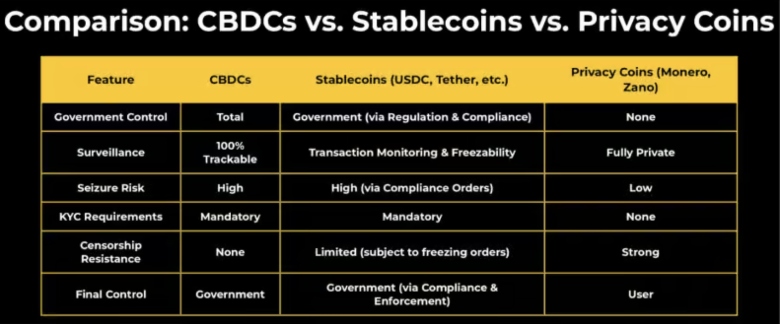
The pace of global CBDC development remains striking. In May 2020, only 35 countries were exploring CBDCs. By early 2025, that number had ballooned to 134 before the US exit, with 65 in advanced stages—development, pilot, or launch. Every G20 country except the US is now involved, with 19 in advanced stages and 13 running pilots, including Brazil, Japan, India, Australia, Russia, and Turkey. Three countries—the Bahamas, Jamaica, and Nigeria—have fully launched retail CBDCs, and 44 pilots are ongoing worldwide. This momentum persists despite Trump’s ban, as other nations see CBDCs as a way to modernize payments, enhance financial inclusion, and compete geopolitically, especially with China’s digital yuan (e-CNY) pilot, the largest globally, reaching 260 million people.
Recent developments underscore this acceleration. In Israel, the Bank of Israel released a 110-page design document in early March 2025, detailing plans for a Digital Shekel. This follows years of research and aligns with Israel’s participation in a 2022 project with the Bank for International Settlements to test international retail and remittance payments using CBDCs. The Digital Shekel aims to improve transaction efficiency and financial access across its tech-savvy population, marking a significant step toward implementation.
In the European Union, the European Central Bank (ECB) is pressing forward with its digital euro, targeting a rollout by October 2025. ECB President Christine Lagarde has been vocal about this timeline, stating in a recent address, “We are on track to introduce the digital euro by October this year, offering a secure and programmable complement to cash that ensures financial inclusion while maintaining privacy standards.” This follows the ECB’s October 2023 decision to enter the preparation phase for a digital retail euro, with a focus on both retail and wholesale applications. The EU’s push reflects a broader European trend, with countries like Sweden and the UK also advancing CBDC pilots, aiming to reduce reliance on US-dominated payment networks like Visa and Mastercard.
Across the Atlantic, Canada’s new Prime Minister, Mark Carney, who assumed office in March 2025, brings a pro-CBDC stance to the table. Carney, a former Governor of the Bank of England from 2013 to 2020, has long advocated for digital currencies as a tool for financial innovation. During his tenure at the Bank of England, he oversaw early CBDC research, including the July 2019 CBDC Technology Forum, which laid the groundwork for the digital pound.
Carney’s alignment with the World Economic Forum (WEF), where he has been a prominent figure pushing for sustainable finance and digital transformation, further underscores his support for CBDCs. The WEF has been a strong advocate for CBDCs, hosting roundtables through 2023 to promote interoperable designs. Under Carney’s leadership, Canada is likely to accelerate its CBDC efforts, building on the Bank of Canada’s 2023 analytical note emphasizing offline payment functionality—a move that could deepen digital control over Canadian finances.
Despite Trump’s EO, the global CBDC train is charging ahead, with the US taking a detour through stablecoins that empower banks and the Fed while stifling privacy and DeFi. The Digital Shekel, the EU’s October rollout, and Canada’s new leadership under Carney show that the world isn’t waiting for the US to catch up—it’s forging a digital future where control, not freedom, may be the ultimate prize.
Stablecoin Legislation: Backdoor CBDCs by Design
The STABLE Act and GENIUS Act, introduced in early 2025, represent a significant pivot in US financial policy. Rather than directly pursuing a CBDC, these bills create a framework for privately issued digital dollars that would achieve the same surveillance and control objectives while appearing to maintain separation between government and the digital currency system.
While President Trump’s Executive Order 14178 explicitly banned the Federal Reserve from developing a CBDC, his administration has simultaneously championed these stablecoin bills. This isn’t a contradiction—it’s a calculated strategy to implement the same control mechanisms through different channels.
Comparing the Legislative Approaches
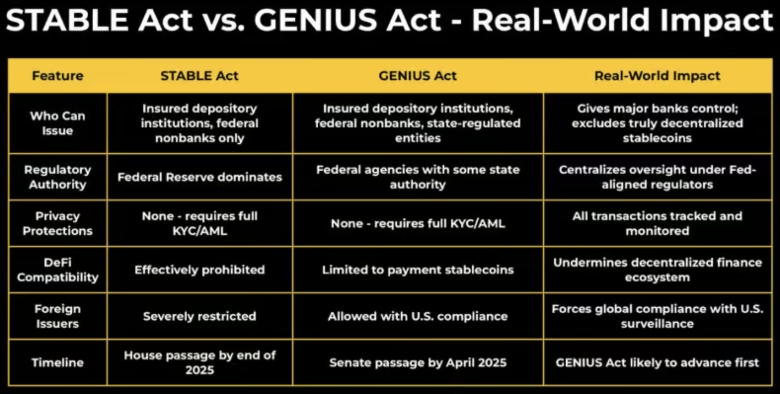
What This Means in Practice
Under both bills, if you bought a stablecoin through an exchange like Coinbase, your transaction would be: 1) tied to your verified identity, 2) reported to the Treasury Department’s FinCEN database, 3) subject to freezing if flagged by surveillance algorithms, and 4) potentially programmable to restrict certain purchases. This mirrors the control mechanisms of a CBDC but through private intermediaries.
The distinction between the bills is largely one of scope and timing. The STABLE Act, sponsored by Representatives French Hill (R-AR) and Bryan Steil (R-WI), takes a more comprehensive approach, covering all stablecoins and giving the Federal Reserve primary authority. The GENIUS Act, introduced by Senators Bill Hagerty (R-TN), Kirsten Gillibrand (D-NY), and Cynthia Lummis (R-WY), focuses specifically on payment stablecoins and preserves some role for state regulators.
What neither bill does is protect financial privacy or enable true peer-to-peer transactions. Both require strict Know Your Customer (KYC) processes, ensuring every digital dollar is tied to a verified identity. Both mandate compliance with Anti-Money Laundering (AML) requirements, guaranteeing ongoing surveillance of transactions. And neither contains provisions preventing the implementation of programmable restrictions on how these digital dollars can be used.
Impact on Major Stablecoins
These bills would fundamentally transform existing stablecoins like Tether (USDT) and USD Coin (USDC):
Tether (USDT), currently the largest stablecoin with a $140 billion market cap as of early 2025, would face significant challenges under both bills. Based outside the US in the British Virgin Islands, Tether would likely be forced to either register as a US entity (bringing it under direct regulatory control) or potentially lose access to the US market altogether under the STABLE Act. The GENIUS Act might allow continued operation with strict compliance requirements.
USD Coin (USDC), the second-largest stablecoin ($25 billion market cap), is better positioned for compliance given its US-based issuer, Circle, and its backing from Goldman Sachs and BlackRock. However, even USDC would face enhanced surveillance requirements, likely resulting in more transaction reporting and potential restrictions on transfers to non-KYC addresses.
The likely outcome is a stablecoin ecosystem dominated by large financial institutions—the same banks that own the Federal Reserve—with comprehensive tracking of all transactions and programmable controls available to government agencies.
The Political Reality
The GENIUS Act is more likely to pass, given its bipartisan Senate support and alignment with the Trump administration’s priorities. With backing from influential figures like David Sacks (Trump’s Crypto/AI Czar) and Howard Lutnick (Commerce Secretary), the bill has momentum for passage before April 2025—well within Trump’s first 100 days. The Senate Banking Committee voted to advance the bill (18-6) on March 13, 2025.
While proponents frame these bills as innovative alternatives to CBDCs, the reality is they implement the same surveillance capabilities through private intermediaries. In some ways, this approach could be even more dangerous than a direct CBDC, as it creates the illusion of market-driven money while embedding government control mechanisms throughout the system.
Understanding these bills reveals why Trump’s Executive Order banning CBDCs while promoting stablecoins isn’t the victory for financial freedom it appears to be. The same surveillance infrastructure is being built—just with different logos on the digital dollars controlling your financial life.
The Regulatory Endgame: Beyond Stablecoins
At first glance, the STABLE and GENIUS Acts appear to simply regulate stablecoins. But in reality, they are part of a coordinated effort to centralize financial control under a permissioned, government-approved digital system. This system is designed to:
- Kill financial anonymity – Every transaction made using regulated stablecoins must adhere to strict Know Your Customer (KYC) and Anti-Money Laundering (AML) rules, ensuring that financial institutions report and monitor all movement of funds.
- Make cash obsolete – With increased digital alternatives being pushed as “safe” and “efficient,” cash transactions will be discouraged and eventually phased out, removing the last truly private method of exchange.
- Tokenize all assets under regulatory control – The goal isn’t just to digitize money, but to tokenize all financial instruments—stocks, bonds, real estate, and even commodities—so they can be tracked, restricted, and programmed.
- Enforce behavioral control through finance – Just as China’s social credit system restricts access to services based on compliance with state mandates, a fully digital financial system allows authorities to block or limit transactions based on political beliefs, carbon footprint, vaccine status, or other arbitrary criteria.
This isn’t just speculation. The foundation for this system is already being built:
- The Bank for International Settlements (BIS) has outlined a Regulated Liability Network (RLN), which is designed to connect central bank money, commercial bank deposits, and tokenized assets under a unified digital framework.
- The European Union’s Digital Euro project explicitly states that future financial transactions will be programmable, enabling authorities to limit how money is used.
- The World Economic Forum (WEF) has pushed for a global financial surveillance system under the guise of preventing fraud and ensuring financial stability—language identical to that used in the STABLE and GENIUS Acts.
Together, these initiatives lay the groundwork for a fully digitized, permissioned economy where financial freedom is an illusion. Stablecoins, far from being an alternative to CBDCs, are simply the stepping stones to the exact same outcome—one where every transaction is monitored, every asset is controlled, and dissent can be silenced with a keystroke.
This is no different from past government moves to strip financial autonomy from the people. In 1933, Executive Order 6102 made it illegal for Americans to own gold, forcing citizens to turn in their gold in exchange for rapidly devaluing paper money. Today, stablecoins serve the same purpose: they lure users into digital systems that the government and banks can easily control—until the day they decide to seize or restrict access to funds, just like they did with gold. The history of government intervention in money should serve as a stark warning: whatever financial tool the state encourages is likely designed for its benefit, not yours.
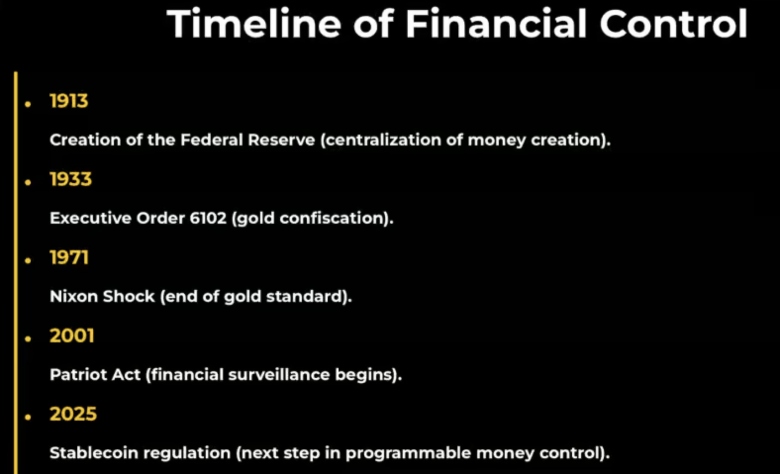
Government financial control is not just a historical pattern—it is happening in real time. The same tactics used to demonetize gold in 1933 and remove cash from circulation today are being deployed through digital assets. The following case studies prove that stablecoins are already being used as tools for financial censorship—demonstrating exactly why privacy-preserving alternatives are necessary.
Case Study: How Stablecoins Have Already Been Used for Financial Censorship
Stablecoins are often marketed as a decentralized, private alternative to fiat currency—but real-world examples prove that they are not censorship-resistant and can be frozen at any time by issuers or regulators.
Tornado Cash Sanctions (2022)
In August 2022, the US Treasury sanctioned Tornado Cash, a privacy protocol used on the Ethereum blockchain. This led to immediate censorship by stablecoin issuers:
- Circle (USDC) froze over $75,000 of USDC in wallets associated with Tornado Cash.
- Tether (USDT) followed by freezing over $100,000 of USDT, despite not being legally obligated to do so.
- Ethereum service providers blocked Tornado Cash-associated addresses, effectively preventing access to funds.
This demonstrated that stablecoins are not censorship-resistant and can be weaponized just as easily as bank accounts.
FTX Collapse & Account Freezes (2022)
When FTX imploded in late 2022, authorities quickly pressured stablecoin issuers to freeze assets tied to the platform.
- Tether froze $46 million in USDT linked to FTX.
- Regulators worked with Circle to blacklist USDC associated with the exchange.
- Customers who had stablecoins on centralized exchanges were cut off from their funds overnight.
Canada Trucker Protest 2022
- The Canadian Freedom Convoy in 2022 saw the government freeze over $8 million in donations, including bank accounts and crypto funds.
- Tether refused to freeze donations, but centralized crypto exchanges cooperated with law enforcement.
- This proves that centralized digital assets are vulnerable to government orders, making privacy coins a necessary alternative.

This proves that stablecoins are not self-sovereign money—they are corporate-controlled assets that can be frozen, blacklisted, or seized at any moment.
Trump’s Ban: Freedom or a Trojan Horse?
Trump’s executive order sounds like a win for liberty. It bans the Fed from creating or promoting a new CBDC, citing risks to privacy and financial stability. It even revokes Obama-era plans for digital dollar experiments. But dig deeper, and it’s not so simple. The order doesn’t touch the Fed’s existing digital system—because it’s not seen as a “new” CBDC. So, the control we already have stays intact. Worse, the order cheers on “dollar-backed stablecoins” like Tether and USDC, private digital currencies pegged to the dollar, as a means to maintain global financial dominance.
Commerce Secretary Howard Lutnick, a vocal advocate for Trump’s tech-driven agenda, has been clear about the administration’s enthusiasm. At the White House Digital Assets Summit, he stated, “Technology is at the foundation of the Trump presidency. He understands technology, he embraces technology, and he’s going to use technology to drive America forward.” Specifically on stablecoins, Lutnick added, “The blockchain and Bitcoin technology are a key part of that thinking and embracing that.” The message is unmistakable: stablecoins are a strategic tool to extend the dollar’s global reach, but they come with significant risks to privacy and autonomy.
David Sacks, Trump’s Crypto/AI Czar and chair of the President’s Working Group on Digital Asset Markets, is overseeing this regulatory push. While he hasn’t directly commented on these bills, his focus on balancing innovation with oversight suggests support for a controlled stablecoin ecosystem. Sacks’ role implies a stance like, “We’ll foster stablecoins, but only under strict rules.” Both bills mandate stringent Know Your Customer (KYC) and Anti-Money Laundering (AML) requirements, meaning every transaction is tracked and monitored. Treasury Secretary Scott Bessent, a Wall Street veteran, reinforces this approach.
Though Bessent has been reserved in public statements, his alignment with financial stability suggests he’d back these measures, likely echoing the administration’s line: “Stablecoins must be secure and compliant to protect the dollar’s global standing.”
The administration’s support is unequivocal. Lutnick has emphasized the strategic importance of stablecoins, stating, “We’re going to use digital assets to pound forward, and Donald Trump is leading the way.” He’s also targeted offshore issuers like Tether, noting, “America will set the standards, and the world will follow.” The GENIUS Act reflects this by allowing offshore stablecoins to operate in the US only if they comply with American regulations, while the STABLE Act takes a harder line, likely restricting their use entirely. This isn’t just about competition—it’s about control.
Stablecoins: Tyranny with Extra Steps
Here’s the rub: Tether and USDC aren’t saints. Tether’s reserves are murky—some say it’s not fully backed by dollars, just a mix of assets. USDC is clearer, but it’s still Circle’s word, not the Fed’s guarantee. If these become our digital money, we’re trading central bank control for corporate control—or both, if banks and the Fed team up. The Fed, after all, is owned by its member banks—think JPMorgan Chase and Citibank—blurring the line between public and private power. Whether it’s Fed Chair Jerome Powell or JPMorgan’s Jamie Dimon issuing a digital dollar, the result is the same: pervasive tracking and control.
The STABLE and GENIUS Acts amplify this risk by enforcing KYC/AML compliance, effectively killing algorithmic stablecoins, and stifling decentralized finance (DeFi) platforms that thrive on anonymity. Innovation is curtailed, as only bank-approved stablecoins can flourish. The order’s push for “open access” to blockchain sounds promising, but stablecoins can freeze funds just as easily. In 2022, USDC blacklisted wallets tied to sanctions. Programmable? Check. Censorable? Check. It’s the same beast, a different logo.
My article flagged CBDCs as tools for “technocratic control”—tracking us, nudging behavior with coded rules. Stablecoins do that already, and Trump’s order, backed by these bills, could supercharge them. The Fed’s digital reserves are at least predictable; private stablecoins add a wild card. If they dominate, we’re not dodging tyranny—we’re outsourcing it to corporate interests under the guise of innovation.
Ties Between the Trump Administration and Stablecoins: A Network of Cronyism and Surveillance
The Trump administration’s embrace of stablecoins as a key element of its financial strategy, formalized in Executive Order 14178 (signed January 23, 2025), leverages the expertise of figures tied to USDC and Tether, marking a stark contrast to the Biden administration’s less decisive approach. Unlike Biden’s team, which struggled to advance coherent stablecoin regulation despite years of discussion, Trump’s administration draws on a network of current and former officials with deep fintech experience, capable of shaping and executing a robust stablecoin framework. Both USDC and Tether, dominant stablecoins with billions in circulation, have established operational ties to this administration, equipping it with the technical and financial know-how to integrate these assets into broader economic policy, far beyond what Biden’s tenure achieved.
Ties to USDC: A Network of Influence
David Sacks, appointed as Trump’s Crypto/AI Czar and chair of the President’s Working Group on Digital Asset Markets, has ties to USD Coin (USDC) through its issuer, Circle Internet Financial. A former PayPal executive, Sacks shares a history with Circle CEO Jeremy Allaire as part of the “PayPal Mafia,” a network of early PayPal leaders who have shaped fintech. Sacks served as PayPal’s COO until 2002, while Allaire joined briefly via the 2000 X.com merger, though no direct collaboration between them is documented. Circle’s $1 million USDC donation to Trump’s Inauguration Committee on January 9, 2025, aligns with this network, with Allaire stating, “We are excited to be building a great American company, and the fact that the Committee took payment in USDC is an indicator of…the potential and power of digital dollars.”
Steven Mnuchin, Trump’s Treasury Secretary from 2017 to 2021, deepens the USDC connection through his extensive ties to Goldman Sachs and fintech networks. Mnuchin spent 17 years at Goldman Sachs, leaving in 2002 as a partner and executive, years before the firm invested $50 million in Circle in 2018 and additional funds in 2022. While he had no direct role in those investments, Goldman’s backing of Circle—confirmed by Circle’s Series E funding announcement—links Mnuchin’s Wall Street orbit to USDC’s growth. Circle’s other major investor, BlackRock, contributed $8 million in April 2022 and manages a portion of USDC’s reserves, further tying the stablecoin to Trump’s financial sphere, where BlackRock CEO Larry Fink has served as an informal advisor since the 2024 election.
Mnuchin’s ties to USDC extend through his collaboration with Brian Brooks at OneWest Bank, where Mnuchin was chairman and Brooks served as chairman from 2014 to 2015, per corporate records. Brooks later became Coinbase’s chief legal officer from 2018 to 2020, during which he worked with Circle on USDC’s development as co-founder of the Centre Consortium, which managed the stablecoin until its dissolution in 2023. Brooks’ advocacy for private-sector digital currencies—articulated in a July 2020 Yahoo Finance article where he argued the private sector should lead US digital dollar efforts—directly supported USDC’s rise.
Appointed Acting Comptroller of the Currency under Mnuchin in May 2020, Brooks issued guidance (e.g., OCC Interpretive Letter 1174) allowing national banks to hold stablecoin reserves, a move that benefited Circle’s operations. This interplay between Mnuchin’s Treasury tenure, his prior Goldman Sachs network, and Brooks’ regulatory actions illustrates a revolving door between government and fintech that bolstered USDC.
Ties to Tether: A Controversial Alliance
Lutnick’s ties to Tether are even more direct and controversial. Cantor Fitzgerald, under Lutnick’s leadership, has been Tether’s primary US banking partner since 2021, managing billions in US Treasury bills that allegedly back USDT, the world’s largest stablecoin with a $140 billion market cap as of early 2025. Cantor earns tens of millions annually in fees for this role and, according to a November 2024 Wall Street Journal report, acquired a 5% stake in Tether for $600 million last year. Lutnick’s firm also agreed to collaborate with Tether on a $2 billion Bitcoin-backed lending program, announced in November 2024, further entwining their interests. His vocal defense of Tether—claiming at the 2024 World Economic Forum, “From what we’ve seen…they have the money they say they have”—has drawn scrutiny, especially given Tether’s history of opacity.
Investigative journalist Whitney Webb and YouTuber Coffeezilla have raised questions about Tether’s solvency and financial transparency. Webb, in her 2022 book One Nation Under Blackmail, critiques Tether’s opaque reserve practices, while Coffeezilla, in his 2023 video “Tether: The Stablecoin Scandal,” highlights its reliance on attestations rather than independent audits. He points to Tether’s reserves including non-Treasury assets like gold and Bitcoin, as well as loans to third parties, raising doubts about its ability to maintain a 1:1 dollar peg under stress. Both note Tether’s partnership with Cantor Fitzgerald, which has managed its US Treasury holdings since 2021, though the firm’s role doesn’t fully resolve concerns about the stablecoin’s backing.
Lutnick’s influence extends beyond finance. Tether’s $775 million investment in Rumble, a conservative streaming platform, in December 2024—reportedly facilitated by Lutnick’s ties to the Trump camp—illustrates how stablecoin profits intersect with political agendas. Rumble, previously taken public by Lutnick’s associate and Trump ally Peter Thiel, benefits from Tether’s capital, further aligning crypto with Trump’s political network.
Legislative Reinforcement and Impact
The STABLE Act (House, February 6, 2025) and GENIUS Act (Senate, February 4, 2025) exacerbate this control, restricting stablecoin issuance to banks and Fed-aligned entities, with KYC/AML mandates ensuring pervasive tracking. This benefits Circle and Tether, whose investors—like Goldman Sachs and BlackRock for Circle, and Cantor Fitzgerald for Tether—profit while the Fed extends its influence. DeFi platforms are sidelined, as Lutnick pushes the agenda: “We’re going to use digital assets to pound forward, and Donald Trump is leading the way.”
Cronyism and Control
The ties to USDC and Tether—from Sacks, Lutnick, Mnuchin, and Brooks—illustrate a pattern of cronyism. These stablecoins, already used for surveillance and censorship, enable the same control a CBDC would, but under a private label, cloaking digital tyranny in innovation while consolidating power for banks and the Fed at the public’s expense.
The Fragile Foundation of Fiat Currency
Fiat currencies are not designed to last. Their very structure—money created from debt, backed by trust rather than tangible assets—ensures an eventual collapse. Governments exploit fiat to expand their power, printing limitless money to fund wars, social programs, and bailouts, all while devaluing the savings of everyday citizens. This isn’t speculation; it’s historical fact.
Across centuries, fiat systems have crumbled under their own weight. Whether through hyperinflation, political mismanagement, or shifts in global influence, fiat currencies inevitably deteriorate. The only question is how long before the breaking point is reached. The US dollar, despite its dominance, is following the same trajectory.
The following table outlines the recurring patterns of fiat currency collapse, offering a roadmap for what awaits the dollar:
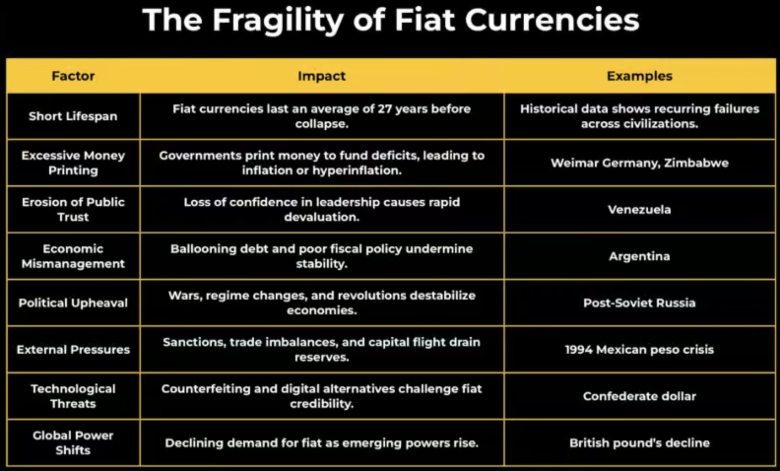
The US Dollar’s Decline: Cracks in the Foundation
While the dollar remains the world’s reserve currency, its long-term survival is far from guaranteed. The same forces that have toppled past fiat systems—debt expansion, declining trust, and technological disruption—are accelerating. Below is a snapshot of the dollar’s mounting vulnerabilities:
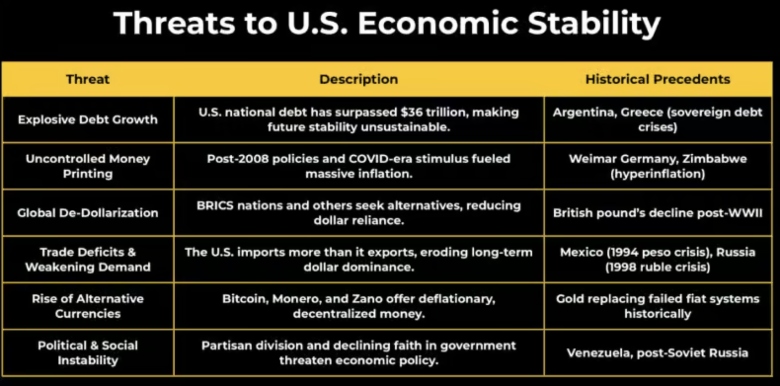
Privacy Coins: The Path to Financial Autonomy
The US government and financial institutions are building a system where transactions can be monitored and controlled, using tools like stablecoins and digital IDs. Privacy coins offer a way out. Monero (XMR), Zano (ZANO), and Kaurma aren’t just for extreme cases—they’re for anyone who values financial independence. Without them, every payment and asset risks being tracked or restricted.
- Monero (XMR): The benchmark for privacy, with ring signatures, stealth addresses, and confidential transactions ensuring untraceable payments—unlike Bitcoin, where details are public.
- Zano (ZANO) with Confidential Layer: A privacy upgrade that anonymizes BTC, BCH, and ETH transactions, making public blockchains resistant to oversight.
- Kaurma: A gold-backed token with Monero-level anonymity, pairing physical asset stability with private wealth storage.
“Privacy isn’t a luxury—it’s a tool for self-reliance.” Using these coins means choosing economic freedom in a world leaning toward centralized control.
The Time to Act Is Now
Financial surveillance is advancing, even without central bank digital currencies (CBDCs). Stablecoins, backed by laws like the STABLE Act and GENIUS Act, require identity tracking. Decades-old rules—like the Bank Secrecy Act and Patriot Act—already monitor transactions, while the Treasury flags small payments like $600. This isn’t hypothetical—it’s active policy. Privacy coins provide an alternative to a system where money is permission-based.
Call to Action: No Compromise
Reforming this from within isn’t an option. State-linked money—be it CBDCs, stablecoins, or bank deposits—comes with oversight. True sovereignty lies in decentralized, private systems:
- Monero (XMR): Untraceable by design, built for secure transactions.
- Zano (ZANO): Anonymizes major cryptocurrencies while keeping them usable.
- Kaurma: Secures wealth with gold and privacy.
These aren’t theories—they’re working solutions for trading and storing value without interference. That’s why they’re under pressure from regulators.
The Privacy Fight Is On
Cash is increasingly suspect. Stablecoins can be frozen instantly. Privacy coins like Monero and Zano face scrutiny—not for flaws, but for restoring confidentiality lost to modern finance. The choice is clear: full surveillance or real autonomy. In a world where money shapes power, this is about practical survival.
What You Can Do Now
- Use Monero and Zano for transactions—reliable, private options to move wealth.
- Leverage Zano’s Confidential Layer to shield BTC, BCH, and ETH.
- Shift assets to Kaurma for gold-backed privacy.
- Avoid centralized exchanges—opt for decentralized, non-KYC platforms.
- Spread the word: privacy is a right worth defending.
Final Note: The Window Is Closing
Picture your accounts locked—not for fraud, but for a flagged donation. Your stablecoins are useless, cards declined. Only the Monero or Zano you secured earlier remains. This has happened globally—thousands have lost access overnight. As surveillance tightens, exiting gets harder. Act while the path is open. The stakes are real, and the time is now.
About The Author:
Aaron R. Day is an experienced entrepreneur, investor, and advisor with a diverse background spanning nearly three decades in sectors like e-commerce, healthcare, blockchain, AI, and clean technology. His political activism ignited in 2008 after his healthcare business suffered due to government regulations. Day has since been deeply involved in various political and non-profit organizations advocating for freedom and individual liberty.Day's efforts have been recognized in major news outlets like Forbes, The Wall Street Journal, and Fox News. He is a father of four and a grandfather, with an educational background from Duke University and Harvard UES.




